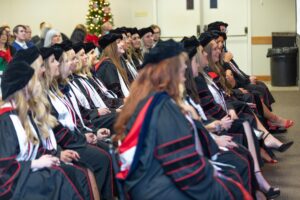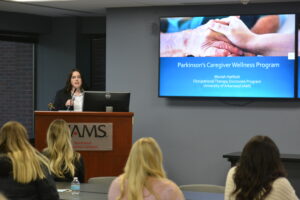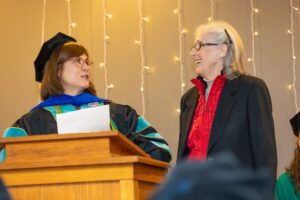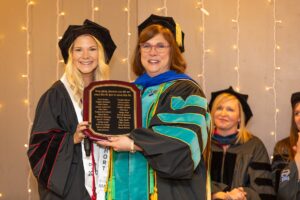View Larger Image
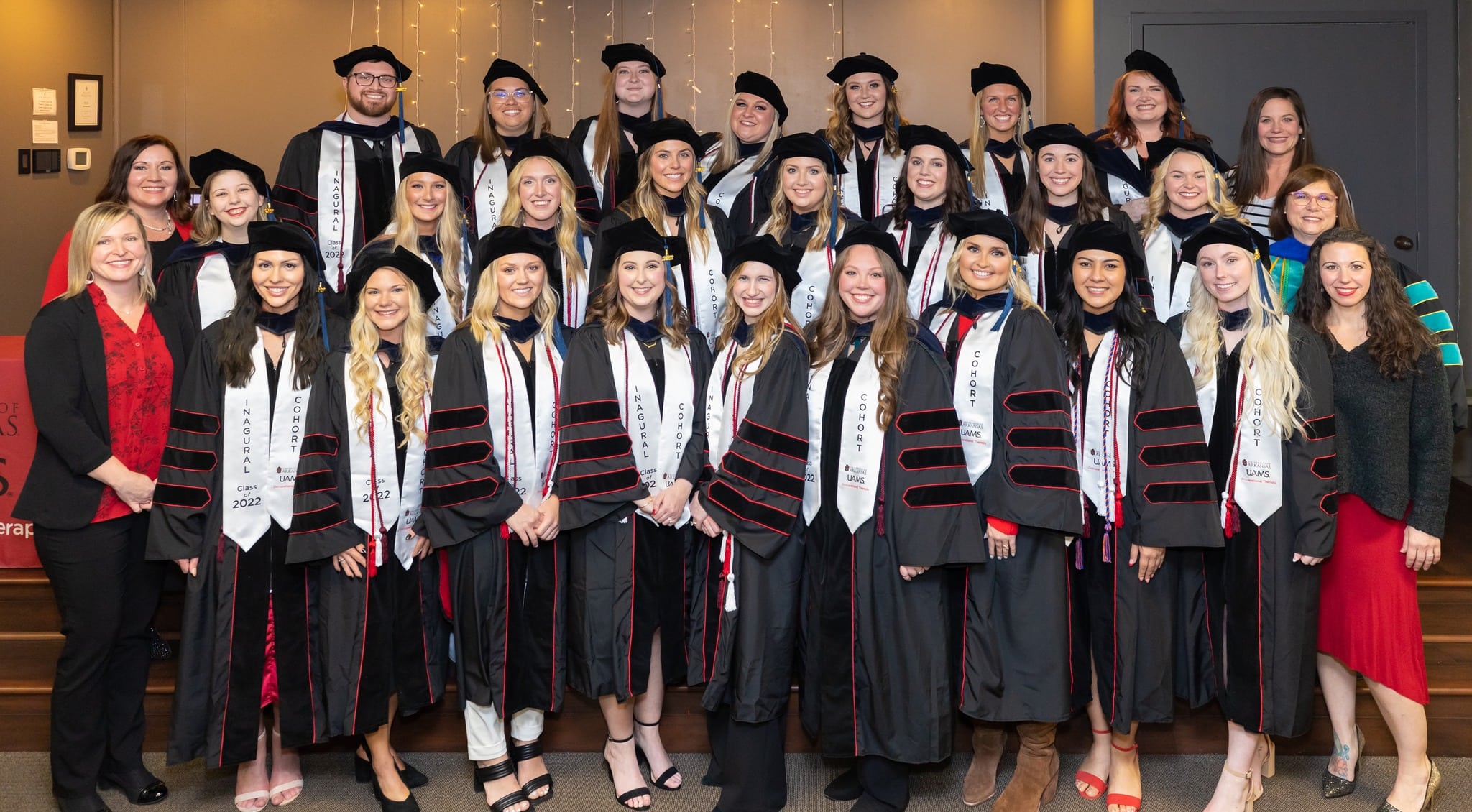
The first Doctor of Occupational Therapy cohort in the university's history.
First Cohort of Occupational Therapy Students Completes Capstone Projects, Graduates
| The Occupational Therapy Doctoral (OTD) program recently celebrated the achievements of its first class of students, who earned their degrees after a challenging three years that included the COVID-19 pandemic.
Prior to the official University of Arkansas commencement on December 17, 2022, the program provided an intimate doctoral hooding and pinning ceremony for the 25 graduates and their loved ones Dec. 16 at Mount Sequoyah Center in Fayetteville.
The OTD program is a collaborative program between the University of Arkansas for Medical Sciences (UAMS) College of Health Professions and the University of Arkansas College of Education and Health Professions. It is the first joint clinical program between the two universities, which provides enhanced support and services for students in the program. The students split their time between the two campuses, both of which are in Fayetteville.
The graduation comes after three years of challenges that tested the mettle of the students and faculty, said Sherry Muir, Ph.D., OTR/L, founding director and department chair of the OTD program.
Not only did the faculty have to create a new doctoral program from scratch and build out new facilities on two separate campuses, but they also faced a global pandemic a few weeks into the very first semester.
But challenges don’t faze occupational therapists. In fact, it tends to bring out the best in them. By their very nature, occupational therapists are a resilient and creative bunch of people, so the group found creative solutions along the way.
“We teach our students to be problem solvers,” said Muir. “This is a critical skill for an occupational therapist. Were there challenges? Absolutely. But behind every challenge is an opportunity.”
Prior to graduation, students gave presentations of their doctoral capstone projects Dec. 14, organized by the characteristics supporting the program’s mission: change agents, innovators, collaborators, advocates, stewards and scholars. The projects provided students opportunities to address health disparities or develop innovative occupational therapy practices by applying what they have learned to real-life situations in their chosen practice area. Through this experience, students gained in-depth exposure to one or more of the following: clinical practice skills, research skills, administration, leadership, program and policy development, advocacy, education and theory development.
For her capstone project, Jessica Candelaria partnered with a Supervised Independent Living (SIL) program at Fostering Change in Fort Smith. SIL programs are part of extended foster care for young adults aged 18-21.
“I was able to create and implement a life skills program aimed at improving client satisfaction with their performance in identified occupations and improve the independent living skills necessary for transitioning out of foster care,” Candelaria said.
Candelaria met with clients two times a week for eight weeks, during which time they engaged in a variety of occupation-based activities to work towards their goals. She also worked closely with their care teams to advocate for and identify the support needed to promote success upon their transition out of foster care.
“I learned so much during my time at Fostering Change about how powerful OT’s impact can be within this field,” Candelaria said. “I am excited for the future and all the opportunities that await!”
For her capstone project, TaraJane House partnered with the UAMS Schmieding Center for Senior Health and Education in Springdale to develop an individualized wellness program for caregivers of people with dementia. Her main goal was to decrease burden and increase feelings of mastery (i.e., the ability to do something in an effective, efficient, and satisfying way). To accomplish this goal, she developed a six-to-eight-week curriculum for participants.
“I interviewed the participants,” House said, “and they shared strategies and skills they had learned, including coping skills, sensory strategies, the importance of social supports, communication techniques, and the importance of engaging in meaningful occupations to maintain their own health.”
“This project is meaningful because it demonstrates the impact of occupational therapy qualitatively through the participants’ stories as well as quantitatively through their improved assessment scores. Personally, this was meaningful because I got to address so many aspects of caregiver burden that I have seen impact people in my life.”
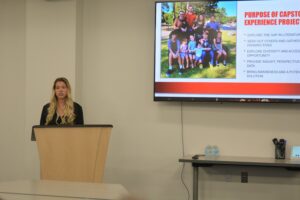
Heather Bellisario’s capstone project looked at the importance of support for 1st-generation and underrepresented graduate students.
Students in the OTD program graduate with a Doctor of Occupational Therapy. This entry-level clinical degree qualifies them to sit for the National Board for the Certification of Occupational Therapy (NBCOT) exam. Once they pass this national board exam, they can apply for licensure in any state, then work as registered occupational therapists (OTR) in a variety of settings, including medical and mental health facilities, schools and community based organizations.
Competition to get into the program is tough. The program received more than 160 applications for the first 27 slots. Muir expects the number of applicants to increase now that the program is fully accredited by the Accreditation Council for Occupational Therapy Education (ACOTE) of the American Occupational Therapy Association. The maximum seven years of accreditation was granted in August 2022 after an on-site review of the program.
“We want to push the boundaries, shake up the way occupational therapy is normally taught,” Muir said. “For too long, occupational therapists have been siloed in our thinking — we treat children or we treat aging adults.
“What happens to these children when they grow into adults who have so-called pediatric/developmental diagnoses like cerebral palsy or autism? Their challenges don’t stop when they reach 21. Who treats them? Many diagnoses aren’t age restricted — we need to be able to help our clients throughout their lifespan.”
Developing a highly integrated curriculum that encompasses this whole person mindset was and continues to be a challenging endeavor, Muir continued.
“But I believe this type of teaching is what sets our program apart from others,” Muir said. “It is also what is going to set apart our students from other occupational therapists out there. We’re getting our students ready to change the world.”

Faculty in the Doctor of Occupational Therapy program. From left, Kandy Salter, Anna Harris, Amanda Troillett, Maria Ball, and Sherry Muir (program chair).
